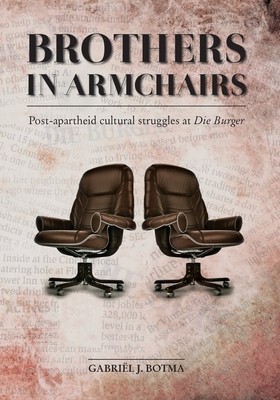
- We will send in 10–14 business days.
- Author: Gabriël J Botma
- Publisher: Sun Press
- ISBN-10: 1920689524
- ISBN-13: 9781920689520
- Format: 17.8 x 25.4 x 0.8 cm, softcover
- Language: English
- SAVE -10% with code: EXTRA
Reviews
Description
This book gives a fascinating insight into the engine room of the once powerful political communication instrument of the then ruling National Party: Naspers and its founding newspaper, Die Burger. It shows with academic precision how management, editors and journalists in the field played out their parts in the transformation period of a politically and culturally divided society.
I worked for the Afrikaans newspaper Die Burger in the Western Cape of South Africa for roughly 15 years as a journalist in various capacities, although admittedly at a stage when the influence of the National Party (NP) on Die Burger and society in general was waning. Still, when I started there in December 1988 as general reporter, I was seriously conflicted. On the one hand I had just tied the knot and was overjoyed to have found a job at a hallowed institution of Afrikaans journalism - the oldest, biggest (and only) regional daily Afrikaans newspaper in the province. But, at the same time, the prospect of working for the notoriously conservative supporter of the NP was troubling. Luckily, once inside the newsroom, I found that
I was not alone in experiencing this dilemma.
EXTRA 10 % discount with code: EXTRA
The promotion ends in 20d.10:16:08
The discount code is valid when purchasing from 10 €. Discounts do not stack.
- Author: Gabriël J Botma
- Publisher: Sun Press
- ISBN-10: 1920689524
- ISBN-13: 9781920689520
- Format: 17.8 x 25.4 x 0.8 cm, softcover
- Language: English English
This book gives a fascinating insight into the engine room of the once powerful political communication instrument of the then ruling National Party: Naspers and its founding newspaper, Die Burger. It shows with academic precision how management, editors and journalists in the field played out their parts in the transformation period of a politically and culturally divided society.
I worked for the Afrikaans newspaper Die Burger in the Western Cape of South Africa for roughly 15 years as a journalist in various capacities, although admittedly at a stage when the influence of the National Party (NP) on Die Burger and society in general was waning. Still, when I started there in December 1988 as general reporter, I was seriously conflicted. On the one hand I had just tied the knot and was overjoyed to have found a job at a hallowed institution of Afrikaans journalism - the oldest, biggest (and only) regional daily Afrikaans newspaper in the province. But, at the same time, the prospect of working for the notoriously conservative supporter of the NP was troubling. Luckily, once inside the newsroom, I found that
I was not alone in experiencing this dilemma.


Reviews